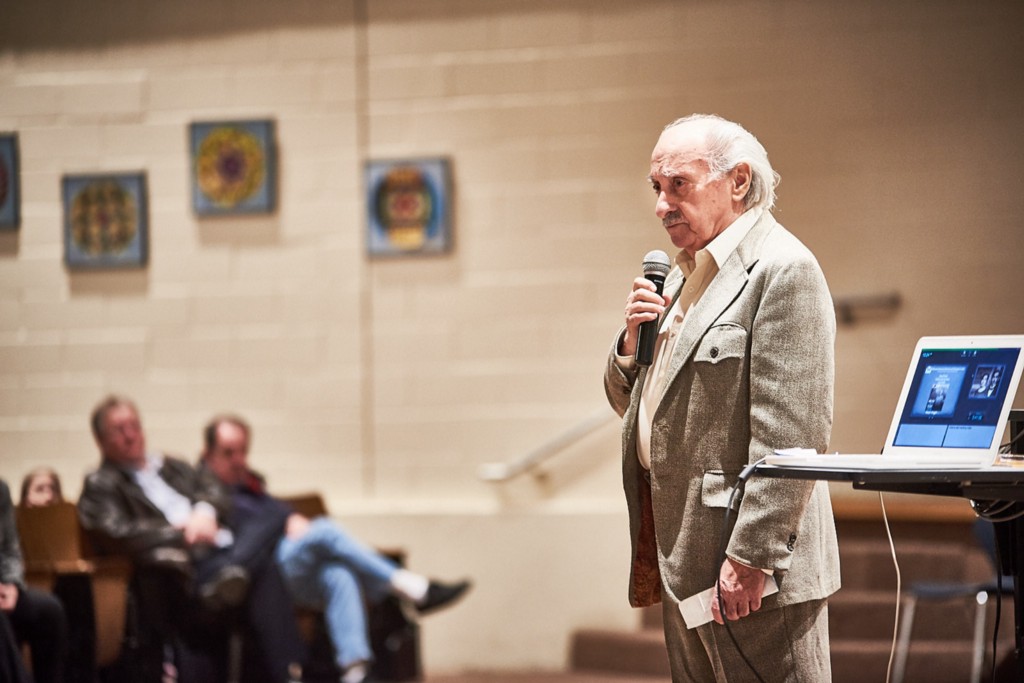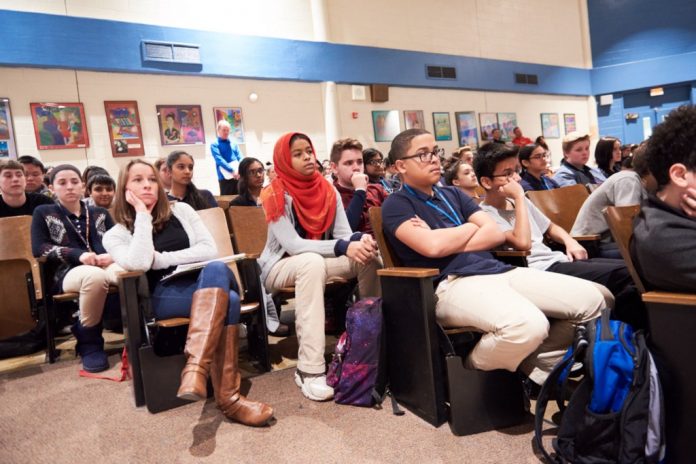MARIA YOUNG / TIMES PHOTO
Chuck Feldman had a message for the Baldi Middle School students about to listen to Holocaust survivor David Tuck.
“You will never forget the next hour,” he told them.
Feldman is president of the Holocaust Awareness Museum and Education Center, based at KleinLife, 10100 Jamison Ave.
The museum’s motto is, “Preserving History to Learn from the Past.”
Among its missions, the museum employs Holocaust survivors and World War II liberators to tell their stories, and Tuck is considered an especially good ambassador.
In the last school year, 30 eyewitnesses have completed nearly 500 programs and reached more than 43,000 students. Those numbers are expected to increase with the passage of the state’s Holocaust and genocide education law.
Tuck’s presentations are titled Never Forget. David Tuck: A Story of Holocaust Survival.
The way Feldman sees it, Tuck’s appearances are as valuable as if George Washington, Abraham Lincoln and Martin Luther King were around today to speak about their experiences.
Feldman told the young people that they should go home and tell their parents and others what they learned about the Holocaust, which claimed 6 million Jewish lives, though there are some people who claim the genocide never took place.
Tuck spoke at three assemblies to more than 1,400 sixth-, seventh- and eighth-graders at Baldi, at 8801 Verree Road in Bustleton. He even signed a few autographs and posed for some pictures.
Born in Poland, he lost his mom, Paula, when he was 6 weeks old and was raised by his grandparents, meeting his dad for the first time at age 8.
After the 1939 German invasion of Poland, the then-9-year-old boy was sent to a labor camp and given the number 176.
“Dave Tuck didn’t exist anymore,” he said.
All-around conditions were bad, but Tuck didn’t dare mention when he was sick.
“I was afraid they were going to kill me,” he said.
Eventually, he was sent to Auschwitz and tattooed with the number 141631.
“I still have it today,” he said.
An estimated 1 million people died at the dozens of Auschwitz camps.
“The only way to go free from there was to die,” Tuck said.
Tuck recalls working hard and eating food out of trash cans while fearing for his life at times.
Finally, in 1945, Americans and allies liberated the camps.
At the time he was freed, he was 15 years old and weighed all of 78 pounds.
Later, he spent some time in Italy and Paris before getting married in 1950 and coming to America. He became a successful businessman, specifically in the interior decorating field.
He’s lived and worked in Brooklyn, the Bronx and Burlington County, New Jersey. Today, he lives in Levittown. He has a daughter, three grandchildren and nine great-grandchildren.
Over the years, he has told his story to more than 10,000 students. He doesn’t forgive or forget, but also doesn’t dwell on the experience.
In his address and in a question-and-answer session at Baldi, he urged students to walk away from bullies and to stay in school.
While in the camps, he maintained a will to live and prayed to God each night to be able to see light the next day.
Tuck remembers thinking to himself, “Dave, don’t give up. You’re going to make it.”
“And I made it,” he said. ••

Never forget: David Tuck recently gave a presentation titled Never Forget. David Tuck: A Story of Holocaust Survival at Baldi Middle School. In 1939, the then-9-year-old boy was sent to a labor camp and eventually Auschwitz. He was freed in 1945. At the time, he was 15 years old and weighed about 78 pounds. MARIA YOUNG / TIMES PHOTO





